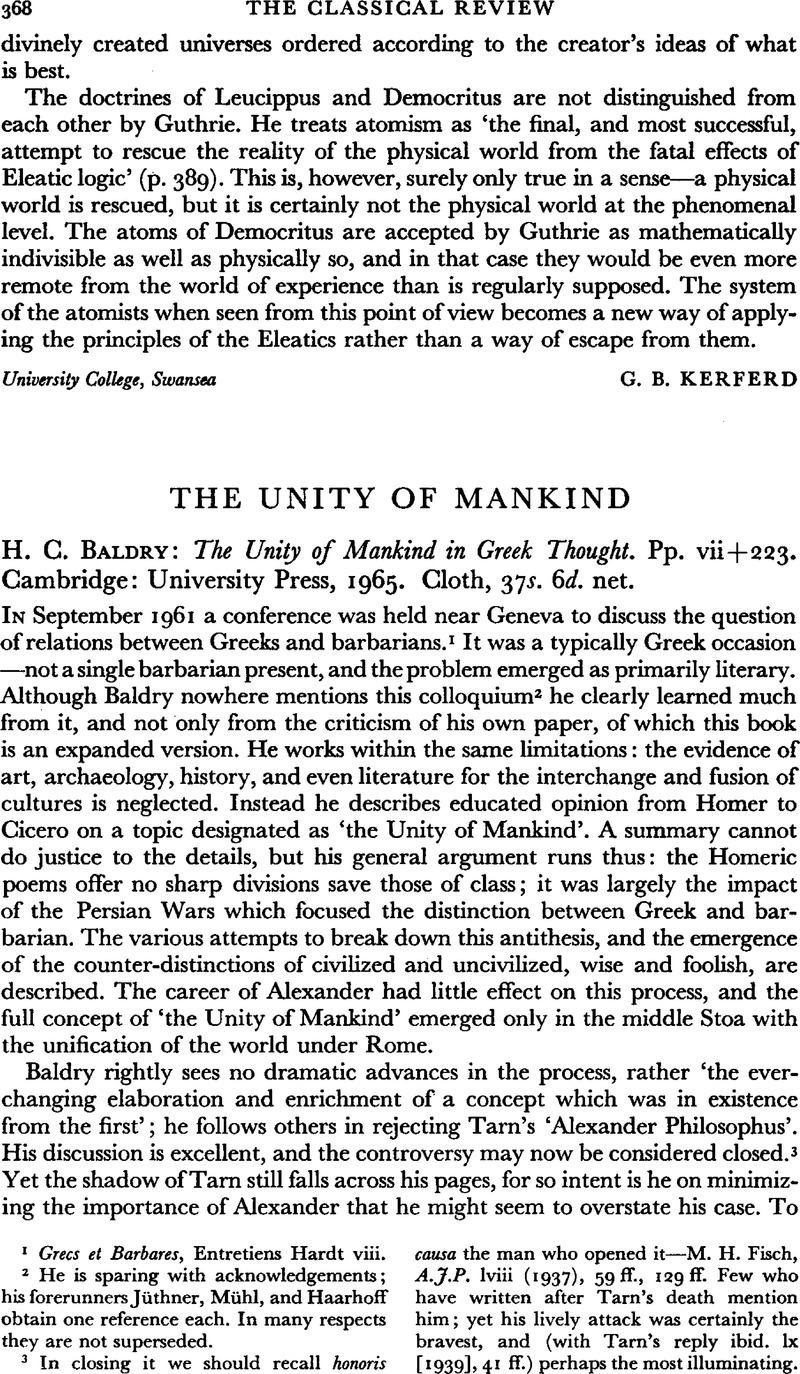No CrossRef data available.
Published online by Cambridge University Press: 27 February 2009

page 368 note 1 Grecs et Barbares, Entretiens Hardt viii.
page 368 note 2 He is sparing with acknowledgements; his forerunners Jüthner, Mühl, and Haarhoff obtain one reference each. In many respects they are not superseded.
page 368 note 3 In closing it we should recall honoris causa the man who opened it—Fisch, M. H., A.J.P. lviii (1937), 59 ff.Google Scholar, 129 ff. Few who have written after Tarn's death mention him; yet his lively attack was certainly the bravest, and (with Tarn's reply ibid, lx [1939], 41 ff.) perhaps the most illuminating.
page 369 note 1 Kock = 385 Koerte; Baldry ignores Koerte.
page 369 note 2 Here and in J.H.S. lxxix (1959), 3 ff.Google Scholar
page 369 note 3 J. Lippert, De epistula pseudoaristotelica περ⋯ βασιλε⋯ας commentatio (Diss. Hal. 1891); M. Plezia, Aristotelis Epistularum Fragmenta, E 8; cf. Stern, S. M., Le Muséon lxxvii (1964), 187 ff.Google Scholar, esp. n. 10; Bielawski, J., Rocznik Orientalistyczny xxviii (1964), 7 ff.Google Scholar, esp. 18 f. Further studies are imminent, from Warsaw (Bielawski and Plezia) and Oxford (Stern and myself).
page 370 note 1 Cf. Jüthner, J., Hellenen und Barbaren, 55 ff.Google Scholar
page 370 note 2 Bibliography in Rostovtzeff, S.E.H.H.W. 1358, n. 4; add: A. Delatte, Essai sur la polilique pythagoricienne, index s. ‘harmonie’; de Romilly, J., J.H.S. lxxviii (1958), 92 ff.Google Scholar; P. J. T. Endenburg, Koinonia, c. 2; C. Brink, O., Phronesis i (1955–1956), 123 ff.CrossRefGoogle Scholar; W. Pötscher, Theophrastos περ⋯ ε⋯σεβε⋯ας; J. Kaerst, Die anlike Idee der Oekumene; J. Vogt, Orbis Romanus; Gisinger, F., ‘Oikumene’, P.–W. xvii. 2, 2123 ff.Google Scholar; Meister, K., Eranos xlvi (1948), 102 ff.Google Scholar; H. Kramer, Quid valeat ⋯μ⋯νοια in litteris Graecis (Diss. Göttingen, 1915); Nestle, W., Vom Mythos zum Logos, 381 ff.Google Scholar; de Ruiter, S. Tromp, Mnem. lix (1932), 271 ff.Google Scholar; Momigliano, A., C.Q. xxxvi (1942), iii ff.Google Scholar; Heinemann, I., ‘Humanitas’, P.–W. Suppl. v, 282 ff.Google Scholar; F. Beckmann, Humanitas; B. Snell, The Discovery of the Mind, c. 11; Kittel, Theologisches Wcrterbuch, s. εἰρ⋯νη, οἰκουμ⋯νη. Articles on harmonia, homonoia, Friede, are promised in Klauser, Reallexicon; for personifications see P.–W. s. Eirene, Harmonia, Homonoia, Oikumene 2, Philia 3.
page 370 note 3 Alexander the Great, ii. 400.